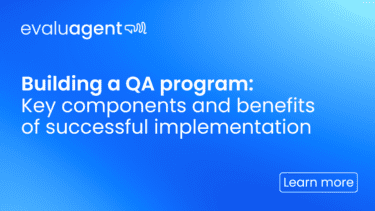What motivates agents to do a good job?
How can contact centres get the best out of their frontline – even when they’re working remotely?
How can we stand out when increasing numbers of businesses are competing on CX?
Contact centre leaders around the world have been asking themselves these questions as COVID-19 continues to disrupt how, where and when we work. And whilst there’s no single magic ingredient that will provide the answer to all of them, a strong focus on employee engagement provides a solid foundation is essential for making progress here.
Traditionally, contact centre leaders have centred their approach to management entirely around efficiency and optimisation.
Doing so whilst neglecting (or in some cases, at the expense of) frontline agents isn’t just damaging to your employees’ sense of worth – it makes a lean, cost-effective and high-performing contact centre impossible to obtain.
Engaged employees, on the other hand, can be the difference between a successful contact centre, and a struggling one. They do everything they can to ensure the success of the business and the satisfaction of the customers they interact with, and are keen to improve their performance.
What Do We Mean By ‘Employee Engagement’?
There are many definitions of employee engagement online. We like entrepreneur and Forbes Leadership columnist Kevin Kruse’s for its simplicity:
“Employee engagement is the emotional commitment the employee has to the organization and its goals.”
It’s important to note that this isn’t quite the same thing as employee satisfaction (although satisfied employees are more likely to be engaged!). Employee engagement is specifically about the extent to which employees feel connected to the organisation they work for – and how this affects their approach to work.
Free download: Team Engagement: The #1 Strategy to Maintain Motivation and Sustain Service Quality
A satisfied agent might show up to work because they don’t mind the pay and they like their colleagues. An engaged agent will show up to work because they care about the goals, mission and overall success of the organisation they work for.
Why Is Employee Engagement Essential for Today’s Contact Centres?
As a result of technological advances over the past decade, your agents:
- Work in a multichannel environment that is often stressful, repetitive and low paying.
- Deal with increasingly complex enquiries for the amount they are paid, thanks to increased use of self-service and chatbots for more straightforward customer queries.
This means that your agents need to be more skilled than ever. They have to be flexible enough to work over different channels, empathetic enough to deal with customer queries effectively and skilled enough to close complex interactions within a reasonable timeframe.
These are skills built up over time. If your service teams don’t enjoy their work and leave frequently (leading to expensive, chaotic employee churn), this is impossible to provide.
If you want a truly customer-centric contact centre with agents that are engaged in customer outcomes and a good bank of operational knowledge, you’ll need to invest heavily in engaging your workforce in the long term.
Employee Engagement Produces Tangible Business Benefits
It should come as no surprise that engaged employees provide better service – but people often underestimate exactly how much of a positive effect it can have.
According to recent research by Gallup, companies that prioritise employee engagement see substantially better customer engagement, higher productivity and lower customer/employee churn – and are 21% more profitable as a result.
Customer expectations with regard to service levels have never been higher. Now more than ever, customers are willing to both pay more for a great customer experience and leave a brand if they feel they have been treated poorly. One in three customers will leave a brand they love after one bad experience, whilst 92% would leave after two or three.
This has created a landscape in which organisations that prioritise CX are set to thrive, whilst those that don’t struggle. Focusing on employee engagement in your contact centre helps set you up for CX success, because your agents will have the skills, enthusiasm and experience to offer top-of-the-range experiences for your customers.
How Can We Increase Employee Engagement?
There are numerous strategies you can use to increase employee engagement. These include:
- Creating a people-focused company culture
- Holding regular, cross-organisation social opportunities
- Publicly recognising good performance
- Providing a pleasant physical workspace
- Providing opportunities for career progression
One of the most powerful ways of increasing employee engagement, however, is by providing meaningful, well-rounded feedback and development opportunities that your agents can act on.
According to Gallup’s State of the American Manager report, 71% of employees feel actively disengaged when managers focus too much on mistakes or poor performance. On the other hand, when managers provide meaningful feedback and work with employees to set workable performance goals, 69% feel actively engaged.
That’s a near complete reversal of perspective, just by focusing on how you give feedback.
Good feedback empowers agents to improve their own performance. If you work on a commission basis, this provides an opportunity for agents to increase their revenue. Alternatively, it helps them demonstrate their ability for a promotion, pay rise, bonus or other incentive.
Just as importantly, good feedback and everything that comes with it – targeted coaching, training and development opportunities – underlines your organisation’s commitment to agent development in general. You emphasise that the work that your agents put in for your company is reciprocal, and that you offer a mutually respectful relationship that can work well for both parties.
Do You Have the Tools To Provide Great Employee Feedback?
To provide genuinely useful feedback to your employees, you’ll need:
- A way of capturing customer feedback based on a particular agent or interaction
- Real-time QA reporting, so feedback remains relevant and actionable
- Processes in place to identify skills gaps, coaching opportunities and needs for further training.
This is where our Smart Quality approach to QA comes in.
Traditional QA is inefficient, slow and susceptible to selection bias. Smart Quality combines the very latest in automation technology with an agent-centred approach that empowers your agents with relevant feedback and coaching.
Find out more about what Smart Quality is and how it can transform your contact centre.




